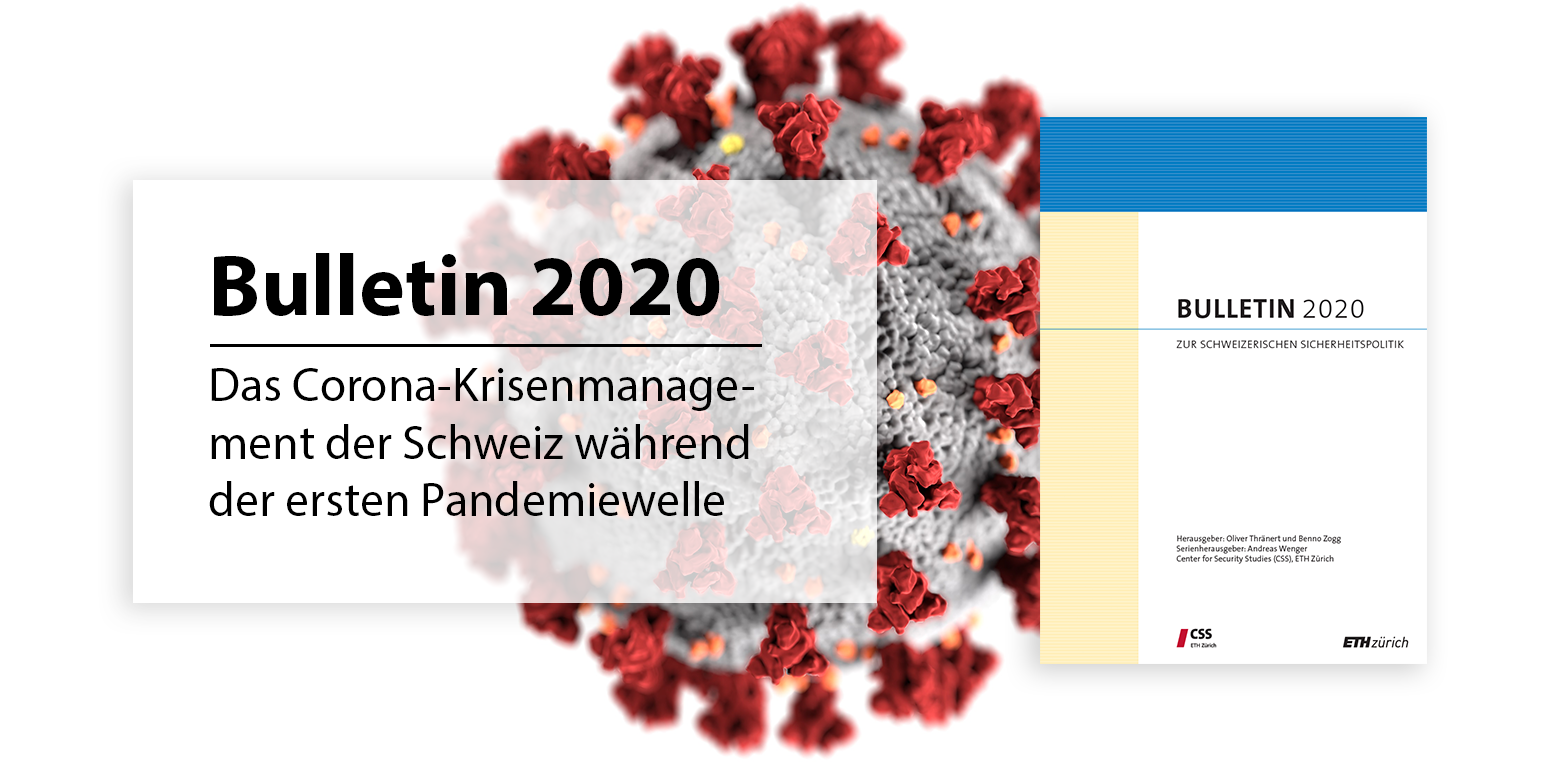Bulletin 2020 on Swiss Security Policy
The corona pandemic is undoubtedly one of the greatest challenges that Switzerland has been facing since the Second World War. For this reason, the Bulletin 2020 on Swiss Security Policy is devoted almost exclusively to Switzerland's corona crisis management during the first wave. Its articles take stock, raise important questions and give recommendations on how to improve crisis prevention and management in the future.

Read the Bulletin 2020 here (in German)
This edition of the Bulletin is special, not only due to its structure. Unlike in past years' editions, this year's authors formulate guiding questions and first recommendations (in German) for the further handling of the Covid-19 challenge. This requires an intensive examination of the Swiss crisis management in the first phase of the pandemic. Thus, the publication is much more extensive than past Bulletin issues.
In addition to an interview with the Chief of the Swiss Armed Forces Thomas Süssli, Bulletin 2020 contains a total of six articles on Switzerland's crisis management during the first wave of the pandemic.
Interview
In the interview (in German) with Bulletin 2020, the Chief of the Armed Forces Thomas Süssli comments on the role of the Swiss Army in this crisis. He assesses its mobilization and cooperation with various partners and elaborates on how the cooperation and preparation for the next crisis can be improved. a pandemic however is only one of the scenarios in which the army has a role to play. Accordingly, Süssli discusses the challenges in cyberspace, the cooperation of the Swiss Armed Forces with partners abroad and, to this end, the role of military peacebuilding.
Discussion of Current Events
The contributions of the researchers of the Center for Security Studies (CSS) at ETH Zürich are prefaced by a summary of the various teachings and results of the analysis throughout the entire Bulletin issue. These are formulated as recommendations covering all chapters in the form of guiding questions that the authors consider important for the development of the legal and planning framework for coping with pandemics. This essence of the findings refers in each case to the specific passages of the following chapters with the corresponding page numbers.
You can find the French version of the recommendations here.
Pandemic Preparedness in Switzerland: Crisis Preparedness as an Ongoing Learning Process (in German)
Andrin Hauri, Kevin Kohler, Benjamin Scharte and Andreas Wenger focus on pandemic preparedness in Switzerland. They describe Switzerland's pandemic preparedness planning as a step-by-step learning process alongside international coordination efforts. A snapshot describes the status of preparations before the outbreak of the coronavirus pandemic. At that time, according to the authors, there were still many gaps and interdependencies. Many weaknesses were known to the experts but had been pursued only hesitantly due to a lack of pressure to act and an absence of political attention.
A chronology of the national and international crisis management in the first phase of the coronavirus pandemic by Kevin Kohler, Andrin Hauri, Benjamin Scharte, Jan Thiel and Andreas Wenger describes the chain of events and measures taken from the outbreak of Covid-19 in China to the return to the "special situation" (besondere Lage) in Switzerland on 19 June. This overview serves as a guide across all chapters to better locate all the parallel events and processes.
Swiss Crisis Management: The Coronavirus Pandemic as a Professional and Political Learning Opportunity (in German)
In the most comprehensive article of this issue, Andreas Wenger, Andrin Hauri, Kevin Kohler, Benjamin Scharte and Jan Thiel discuss the Swiss crisis management. They see the coronavirus pandemic as a professional and political learning opportunity. The chapter focuses on the content dimension – early detection, risk assessment and strategy adaptation as well as crisis communication and digitalization – and on the practical dimension – the crisis organizations of the Confederation and the cantons, the involvement of the scientific community and resource management – of efforts to cope with the first phase of the coronavirus pandemic. The authors conclude that Switzerland must overcome fundamental challenges and retain key lessons learned in order to have differentiated coping options in the future.
Switzerland in the European Crisis Management (in German)
The chapter by Julian Kamasa and Jan Thiel deals with Switzerland in the European crisis management. As an economically and socially strongly interconnected state, Switzerland cannot be isolated, but can only be placed in a European context. In particular, The authors examine the Schengen association and the resulting border management as well as Switzerland's cooperation with EU institutions for disease and civil protection. Kamasa and Thiel note that for a country like Switzerland, access to regional crisis management is essential – and could not be granted in a next crisis without association.
The Swiss Armed Forces on Corona Deployment: A Relevant Scenario for Armed Forces Development?
Michael Haas and Annabelle Vuille examine the contribution of the armed forces in accordance with the principle of subsidiarity in crisis management. They put this deployment into context of the current state of Switzerland's armed forces development. Finally, Haas and Vuille assess what effects the corona crisis could have on the further development, planning and role of the Swiss Armed Forces.
Projects from the CSS
International Project on the Future of (Nuclear) Arms Control (in German)
Oliver Thränert reports that in the coming years, the CSS will be thinking about how arms control could be redesigned and adapted in the course of the project "Redesigning Arms Control for New Realities" so that it can contribute to preventing nuclear wars in the 21st century. Given the complexity of this endeavor, the CSS has assembled a core group of scientists from the US, France, Great Britain and Germany to support the project.
Read the Bulletin 2020 here (in German)